There was another monthly meeting at the Reformers’ Tree yesterday (29/8/21).
This is a very visual piece, so it’s taken me longer than usual to complete. The beautiful pencil drawings are by Michele.
You can see the livestream of the speeches here, on Kellie Jay’s YouTube channel, where it received over 12,000 views in less that three days.
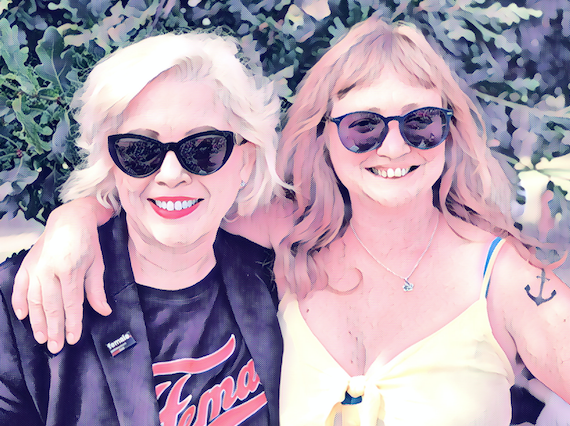
Kellie-Jay Keen & Venice Allan @ the Reformers Tree
Kellie Jay and Venice came up with the idea of ‘taking back the public square’ by holding women’s meetings in open public spaces. There is a long history of free speech associated with Speakers Corner at Hyde Park (you can read more about that in my piece about the last meeting I attended here) and Standing for Women have been aiming for monthly meetings.
The Reformers’ Tree
I’m fascinated by the history of the Reformers Tree. If this doesn’t interest you, just skip to the next section.
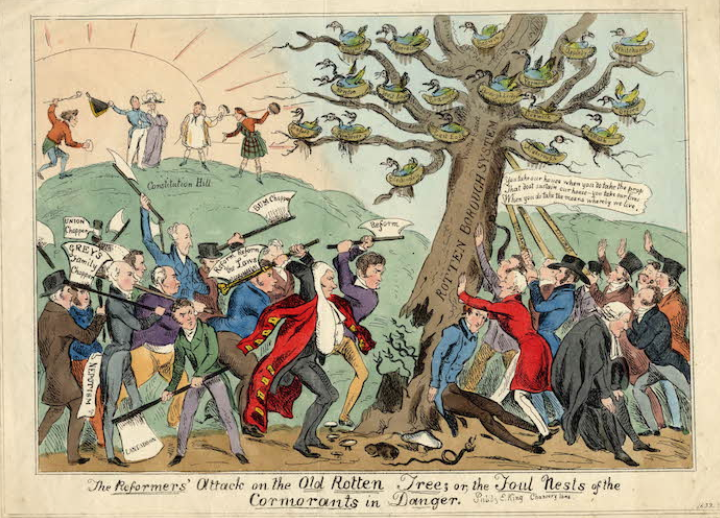 “During the late nineteenth century, Hyde Park emerged as an epicentre for political protest. Workers’ rights, the control of public space and voting laws were all hot topics. During one particular protest in 1866… the Reformers’ Tree was set alight. By morning, all that remained was a charred stump. The burned down tree soon became a symbol of discontent and was used as a rallying point for future Reform League meetings. This tradition contributed to the establishment of nearby Speakers’ Corner becoming a bastion of free speech.”
“During the late nineteenth century, Hyde Park emerged as an epicentre for political protest. Workers’ rights, the control of public space and voting laws were all hot topics. During one particular protest in 1866… the Reformers’ Tree was set alight. By morning, all that remained was a charred stump. The burned down tree soon became a symbol of discontent and was used as a rallying point for future Reform League meetings. This tradition contributed to the establishment of nearby Speakers’ Corner becoming a bastion of free speech.”
Marble Arch London Culture blog 2017
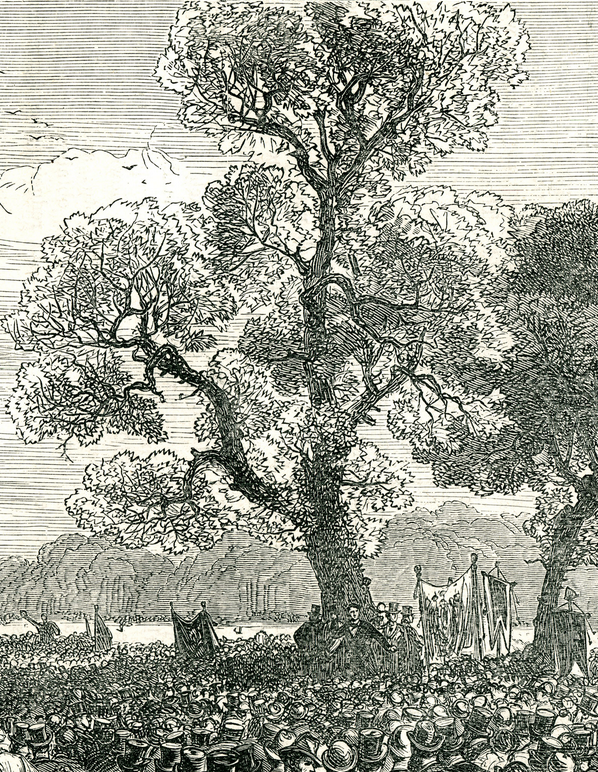
Detail from Meeting at the Reformers Tree – c1890
The original Reformers’ Tree, so stories have it, was a beautiful majestic oak, standing at the junction of nine footpaths near the centre of Hyde Park. The tale is generally told that the tree was destroyed in a political demonstration.
“The tradition of free speech at Speakers Corner,” observes London Remembers, “grew out of the tradition of political meetings at the Reform Tree.”
However, one first-hand version of events differs greatly from the accepted narrative. Ex-police sergeant Edward Owen remembers what he refers to as The Old Reform Tree as having been little more than a manky old elm.
The tree, he recalled in 1885, was “not a vestige of green or anything… simply a stark, blasted-looking old trunk, dead as a doornail, whether from lightning or old age.” Owen recalls the tree being destroyed as people were leaving after a public meeting over a trade grievance.
“It was getting dusk, when suddenly smoke and sparks were seen issuing from the old tree, and it became apparent it had been set on fire, and that we conjectured, by mischievous boys.” Eventually a small fire engine turned up and put out the fire.
“Still there is the space where the old tree stood, if any of my readers care to take a walk and see as I have described.”
Yet the etching above shows a meeting under a massive ‘reformers tree’ in 1890. Was Owen mistaken about it being an elm? Perhaps this was was a different tree? Or was the same tree set on fire twice? When exactly did it burn down? Perhaps there were two Reformers Trees? And why don’t I have a time machine?
There is a more modern mystery surrounding the history of the tree. In November 1977, James Callahan, the then Prime Minister, planted a replacement oak tree on the site of what was referred to as ‘the reformist tree’, on behalf of the Tree Council. Now there is no such tree in the vicinity. You can see a photo of him planting the tree here.
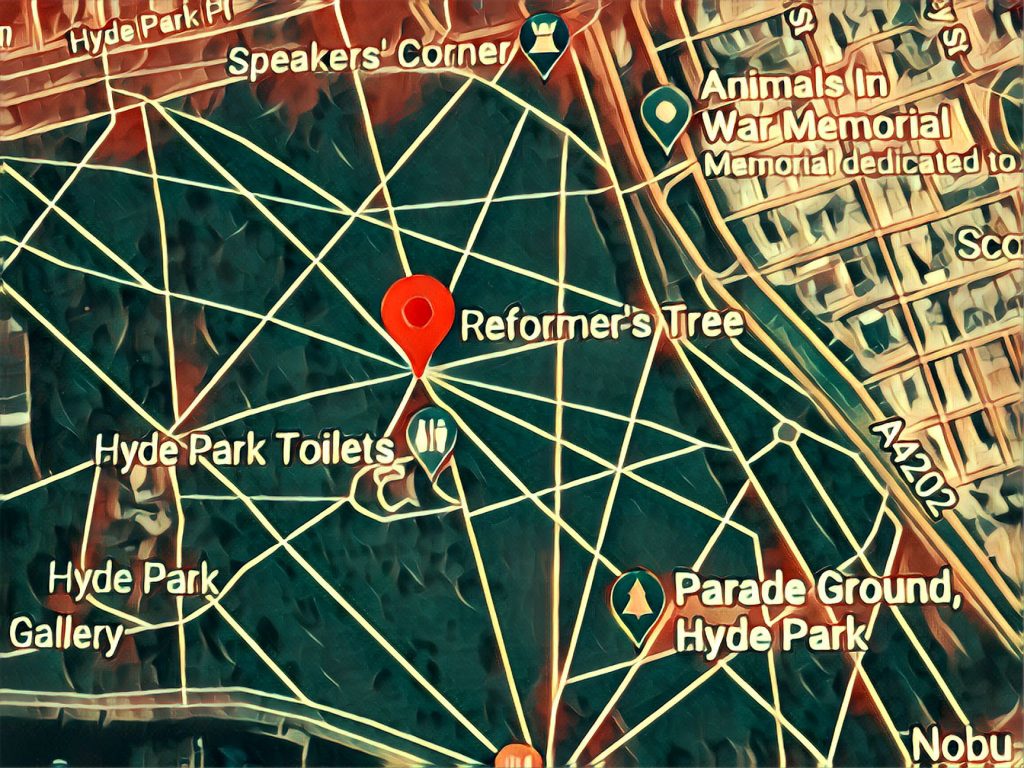
Whatever the truth of the history behind the tree, the site became an established meeting place, not just for the Reform League, who fought for all adult men to have the vote, but also for the women who fought for the vote.
“In the summer of 1906 they (the suffragettes) had a meeting every week near to the Reformer’s tree…. on Women’s Day of 21 June 1908 250,000 women marched to Hyde Park to hear 20 different speaking platforms.”
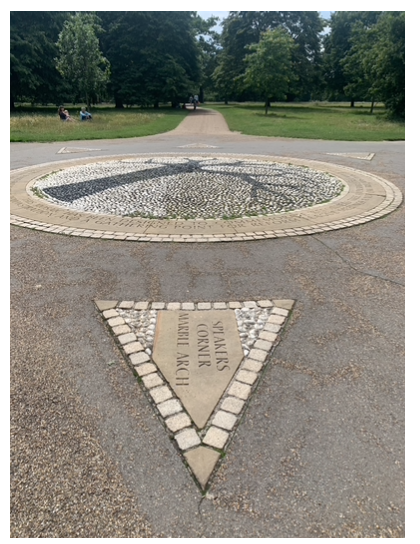
In 2000 the Reformers Tree mosaic was unveiled by artist Harry Gray, who was commissioned by the Royal Parks to create a sculpture to stand at the junction of the nine paths.
The result, his tactile, soft edged, black and white pebble sculpture, goes unseen until you are almost upon it.
As we approached we could see a group of women forming on the grass behind the Tree. By the time Kellie Jay arrived, fashionably late as ever- to be fair she’d driven 100 miles to get here- an expectant crowd had gathered.
Standing for Women @the Reformers Tree
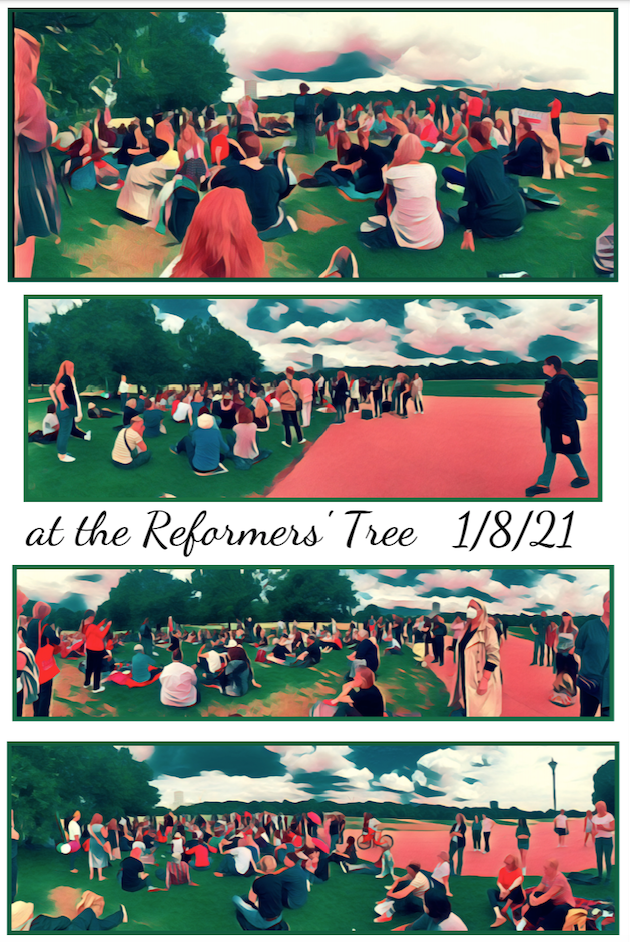
It was warm; the promised rain hadn’t yet put in an appearance. We sat on the grass and ate avocado sandwiches (or at least I did). Michele began sketching some of the women. A group including two young girls had travelled down from Scotland. A baby cooed as it kicked its legs in the sunshine.
Kellie-Jay arrived and the livestream was started as she unpacked a pile of placards and cable ties. On one side of the placards was written ‘I <3 FREE SPEECH’ and on the other was written the dictionary definition of ‘woman’. Her T shirt bore the legend ‘female’, written in the font used for ‘Fame’.
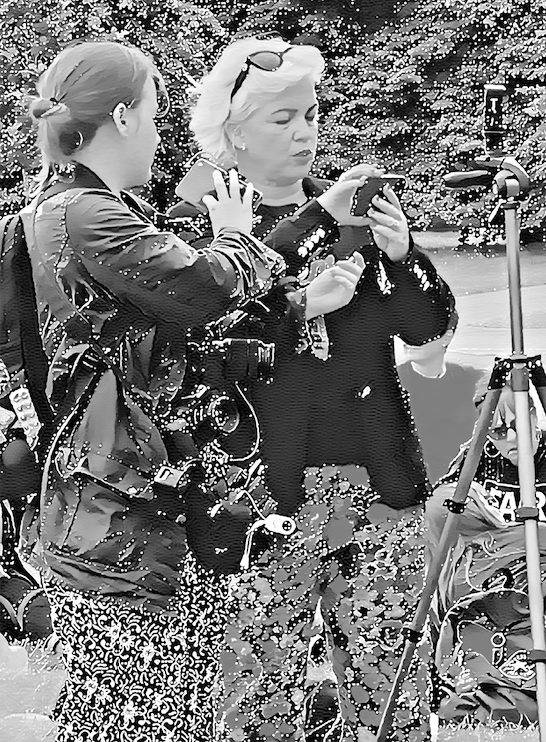
Setting up the live stream
“We’re all here because we all recognise that there is an absolute assault on women’s rights and that starts with the language we’re allowed to use,” began Kellie-Jay, stressing the importance of “meaningful real, actual public square conversations”. By attending these meetings, she predicted, women “will feel a little more brave; a little more empowered; a little more courageous, because you can just turn to the person next to you, and you can say, women don’t have penises.”
 “It’s the same textbook assault on women’s rights, all over the globe when it comes to this,” said Kellie-Jay, who has sold thousand of ‘dictionary definition of woman’ T shirts to a quarter of the countries in the world. “They mutilate our language. They mutilate our children. They obliterate women’s rights.”
“It’s the same textbook assault on women’s rights, all over the globe when it comes to this,” said Kellie-Jay, who has sold thousand of ‘dictionary definition of woman’ T shirts to a quarter of the countries in the world. “They mutilate our language. They mutilate our children. They obliterate women’s rights.”
“We don’t need to agree to hear words”
After pointing out that shorter speeches are often better, Keen reminded everyone that anyone was invited to speak, on any subject. It was fine to disagree, she said, and speakers should be listened to and treated with respect.
“We’re reclaiming this actual public space as a place where women can freely speak about what the hell we like!”
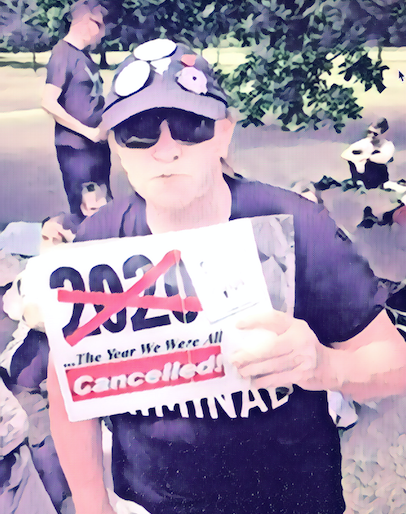 Stella stood up, wearing a ‘Thought Criminal’ T shirt. She observed that it was a big gathering, nice to see children and dogs joining us and good to be able to sit of the grass (at Speakers Corner the ground is hard and everyone tends to stand). She referred to the stabbing of Hatun Tash, a Christian preacher, at Speakers Corner the previous week, and to an article she had written for Uncommon ground, which discussed the work of both Hatun and Kellie Jay, who she said she felt were ‘the bravest women in Britain’.
Stella stood up, wearing a ‘Thought Criminal’ T shirt. She observed that it was a big gathering, nice to see children and dogs joining us and good to be able to sit of the grass (at Speakers Corner the ground is hard and everyone tends to stand). She referred to the stabbing of Hatun Tash, a Christian preacher, at Speakers Corner the previous week, and to an article she had written for Uncommon ground, which discussed the work of both Hatun and Kellie Jay, who she said she felt were ‘the bravest women in Britain’.
“Free speech is for everybody,” she concluded, and added that she was going to give a copy of her book, ‘a cartoon review called ‘2020: The Year We Were All Cancelled!’ to the person who had come from furthest away.

Next, a woman told us that she had lost her job at an important charity ‘because I refer to a woman as a human adult female’.
She is now intending to sue her employer through an employment tribunal.
Paula took the stand and spoke about the proposed online safety bill.
“It’s very difficult to speak the truth, online, but if this online safety bill gets passed, it’s going to become a whole lot worse… under the proposed bill, it’s going to be entirely up to Ofcom, and a select committee of so called experts to decide what counts as online hate, and what doesn’t.”
She told us the bill acknowledges the value of freedom of expression, but for recognised news publishers only – freelance journalists or citizen journalists will be exempt from reporting freely. The attack on Hatun Tash, for example, might not have been reported in the mainstream media if it hadn’t been made public by members of the public.
“Can we leave it up to mainstream journalists to report the truth, the whole truth and nothing but the truth?” she asked.
“No!” called several people from the crowd.
“That’s what I thought.”
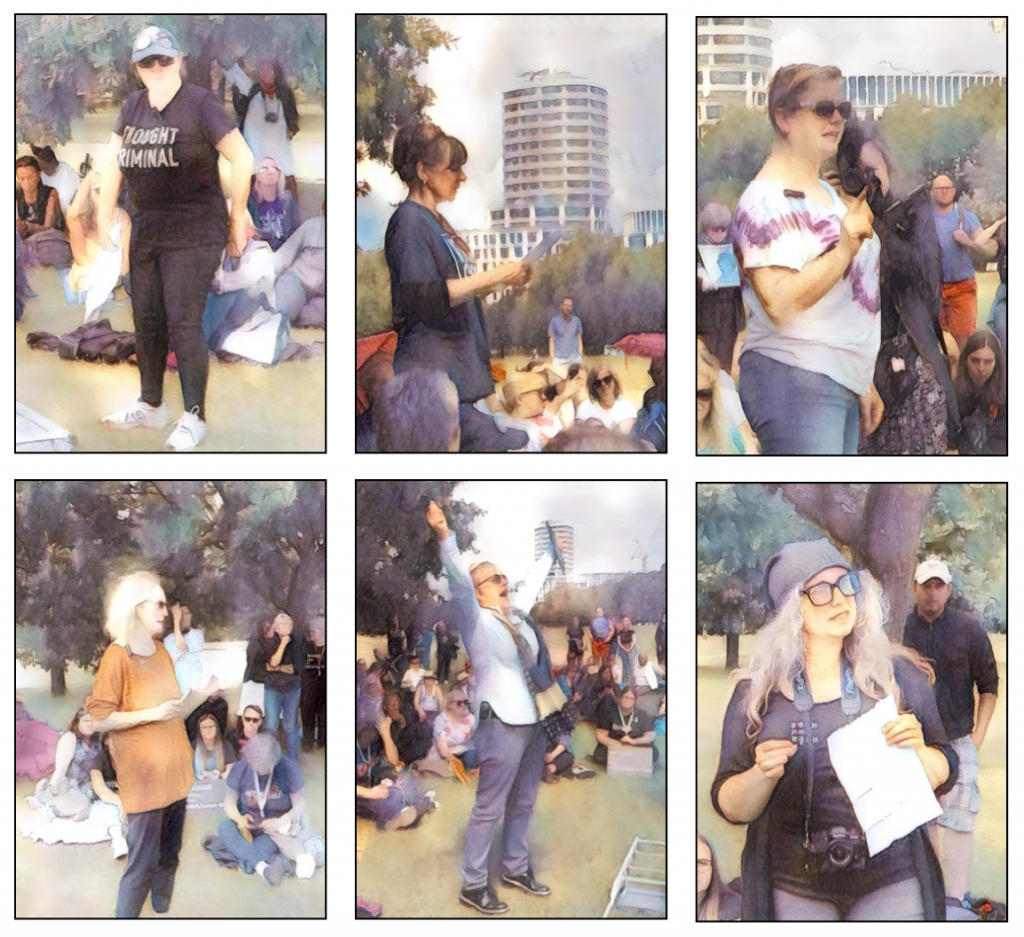
Some of the women who spoke at the meeting (photos with ‘Prisma’ filter)
Next to speak was Marion, co founder and director of For Women Scotland.
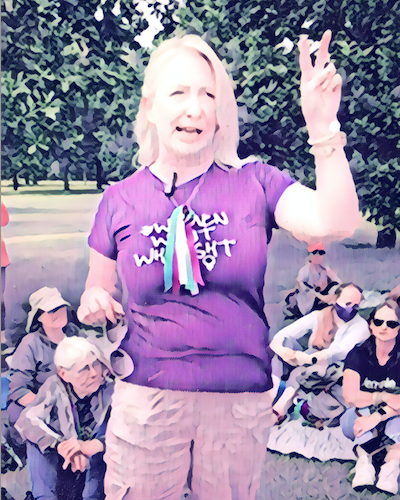
Marion: ‘there are two sexes’.
“I can see faces that came up to support women, last week in Glasgow and the Green, so I’m looking forward to catching up with various people.”
Marion was met with cheers and much blowing of whistles, as she told us this was her first time in Hyde Park and how glad she was that this space had been created ‘so we can have these conversations about kind of women’s rights’. She emphasised the importance of listening to women who expressed concerns about free speech and described Scotlands’s forthcoming hate crime legislation as ‘absolutely shocking,” concluding, “you won’t even be aware of it until it sneaks in and then you realise that you cannot talk, there’s subjects that you are not allowed to talk about. But what I can say is just keep talking about this… on behalf of Scotland, ‘women won’t wheesht!’
Maria was next to speak.

Maria
“Abuse and violence against feminists, by trans activists thugs, is getting worse,” she began. “We’ve seen it recently in Melbourne, in Paris, in different cities in Spain, and most recently in Los Angeles.”
TRAs know, she said, that they won’t be attacked or assaulted if they protest our meetings.
“They wouldn’t be pushed around, they wouldn’t have their placard ripped up; they wouldn’t have their hat and glasses grabbed from them and thrown away. And they wouldn’t be punched in the face, because that’s not our style, it’s the style of their cult.”
In 20 Spanish cities, she told us, feminists have been protesting against draft legislation, promoted by their Minister for Equality, which would bring in self-ID for over-14s, ban psychotherapeutic approaches to gender dysphoria and strengthen ‘hate crime’ legislation.
“They are beautiful to watch,” she said of the protestors. “The women are so vocal and passionate.”
In Barcelona, where more than 300 women and some men had gathered, they were told by the police that they couldn’t hold back the counter protestors and that they should disperse for their own safety. In another city a young woman was physically attacked and hospitalised. Women are scared to leave their homes because of targeted campaigns against them.
“I would like to point out that there is nothing progressive and feminist in targeting a woman for having an opinion you don’t like… there is nothing progressive about trying to intimidate women resisting an ideology and legislation that hurts us, there’s nothing reasonable or decent or humane about using violence against us, that’s not going to make us change our minds or shut us up as you so desperately want, that’s just gonna make us more determined to keep resisting and keep fighting.”
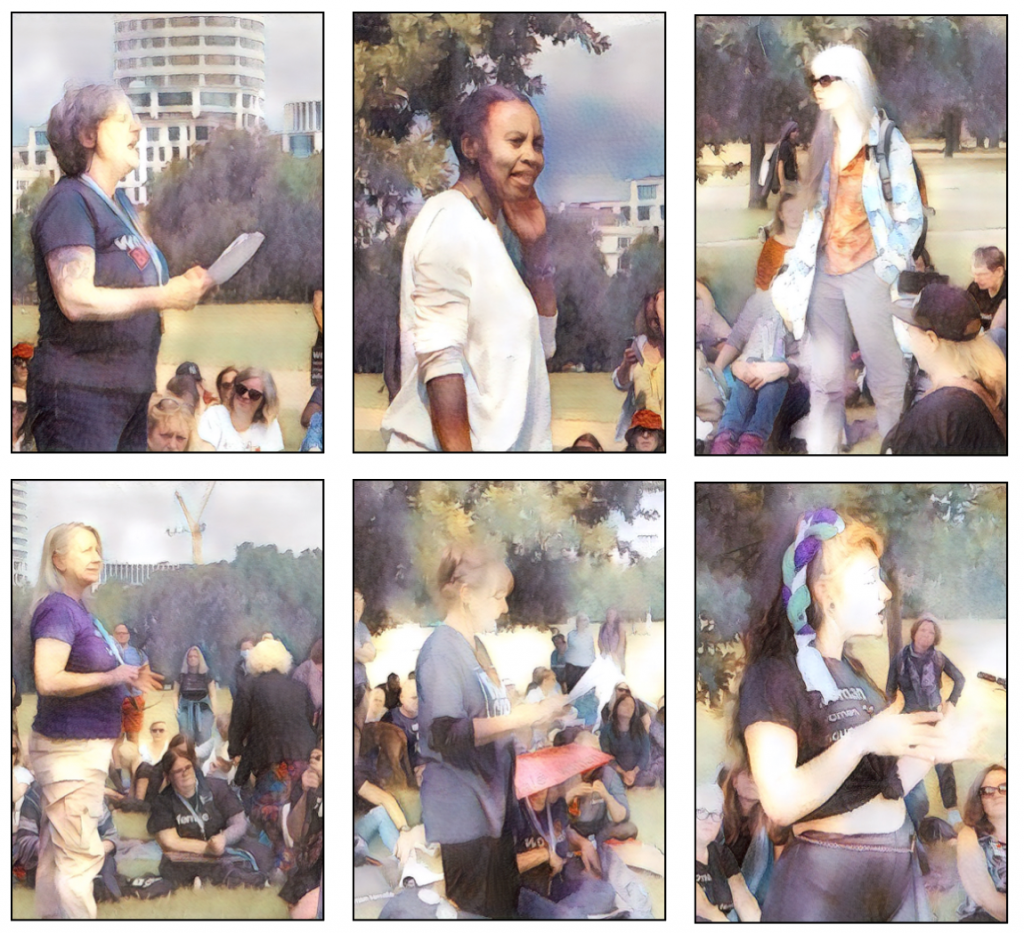
Some of the women who spoke at the meeting (photos with ‘Prisma’ filter)
Kate was next to speak. She said she wanted to speak about bigotry and being accused of being a bigot. What is a bigot? she asked: someone who isn’t open to questioning what they think, or changing their mind.
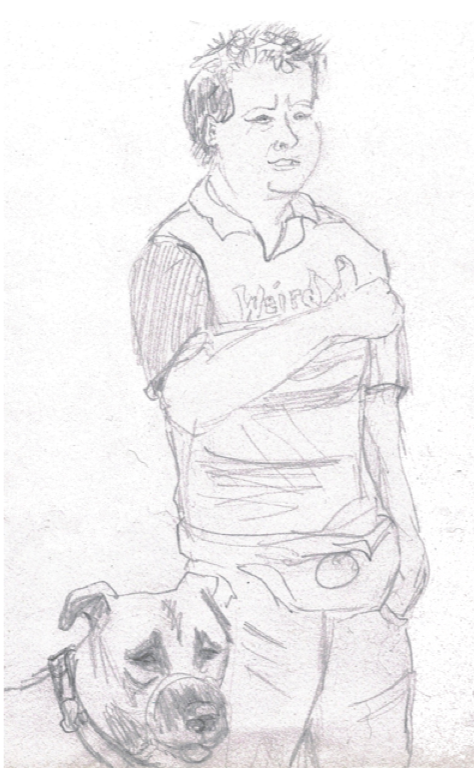 “Most of us feminists have in fact changed our minds.”
“Most of us feminists have in fact changed our minds.”
Kate told us that ‘as a lifelong lesbian feminist’, she had been very accepting of the trans people in the community.
She grew up around drag performers and men who used female names and pronouns and some who believed they were born in the wrong body. After learning more about these issues and how they affect women, and taking into consideration new information, she changed her mind.
The same, she said, with her position on prostitution. It’s important to challenge those who call us bigots.

“Most of the young, liberal, trendy women that I meet: I don’t think they’re evil; I don’t think they’re necessarily even handmaidens as such. They’re just largely misinformed or uninformed… they’re unaware of the deeper philosophical notions about how men and male supremacy define women.”
The next speaker was Lexi from Stop Surrogacy Now UK, a grass roots organisation, focusing on surrogacy law reform in the UK.
“For those who are unsure what a woman is, the fog of confusion seems to lift from their eyes when it comes to one thing- buying babies.”
Lexi went on to observe that ‘words matter’ and in surrogacy there is an untethering of words from reality. The meaning of the word mother is lost. We are told surrogacy is altruistic, so the pay is called ‘compensation’. Surrogacy is framed as a medical treatment, or even a reproductive right. The voices of surrogate born adults and mothers who regret their experiences are rarely heard.
Legislation is currently being suggested to lower the age of potential surrogate mothers. Lexi was “shocked to hear the age of 16 being discussed in evidence sessions with the question of capacity assessment.”
Women don’t have to have been mothers before they become surrogates; there is no upper age limit for surrogate mothers. There is no limit on the number of babies a woman can bear for others and there is no lower or upper age limit for commissioning parents.
“Let’s raise up the voices of surrogate born children and the mothers who gave birth to them. Let’s call a mother a mother,” she concluded.
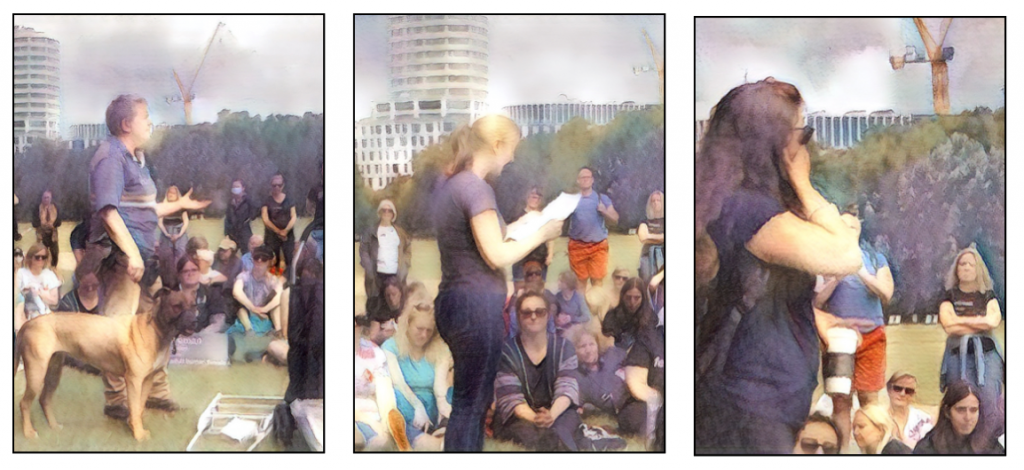
Jan from Object was next to speak.
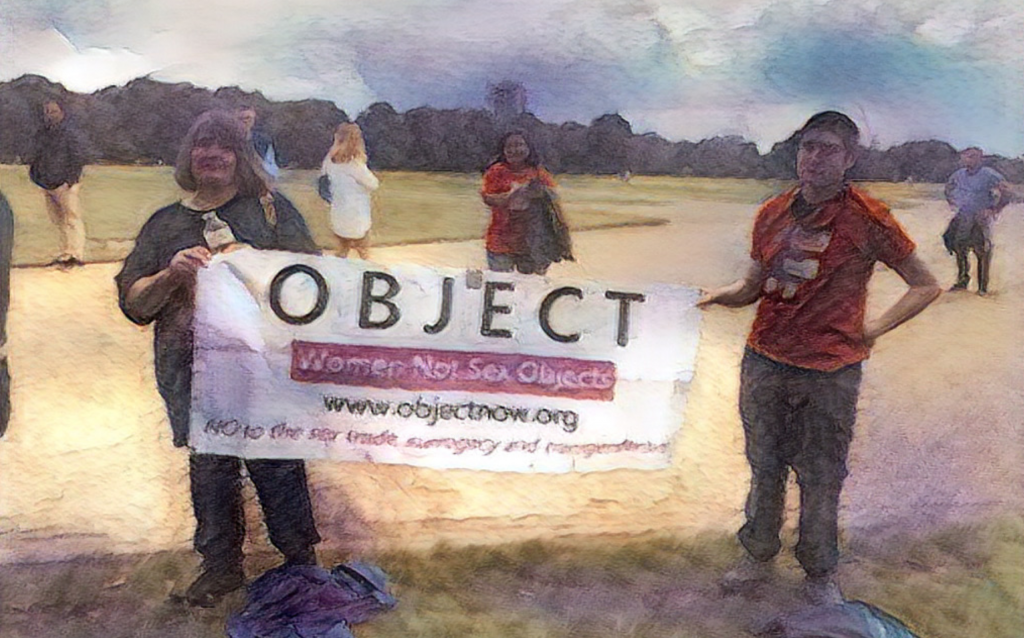

Jan
Jan began by criticising the Law Commission who ran a consultation on surrogacy in which they failed to look at the ethics behind it and asked no questions about how it affected women. She feels the consultation is not fit for purpose and should be done again, as surrogacy has wide reaching implications for all involved. Object designed their own consultation in which they listed around 50 problems with surrogacy. 90% of respondents agreed with them. Not only that, but they raised further issues of concern that Object had not considered. Object’s consultation has been written up into a report.
Stonewall, she tells us, believed the issue only affected gay men- suggesting that they ‘forgot’ that lesbians could be surrogates and thus might be affected.
She ended with a quote from a child born of surrogacy, whose relationship with the parents who brought her up had floundered.
“In my life, where my mum should have been, there was just a pay check.”
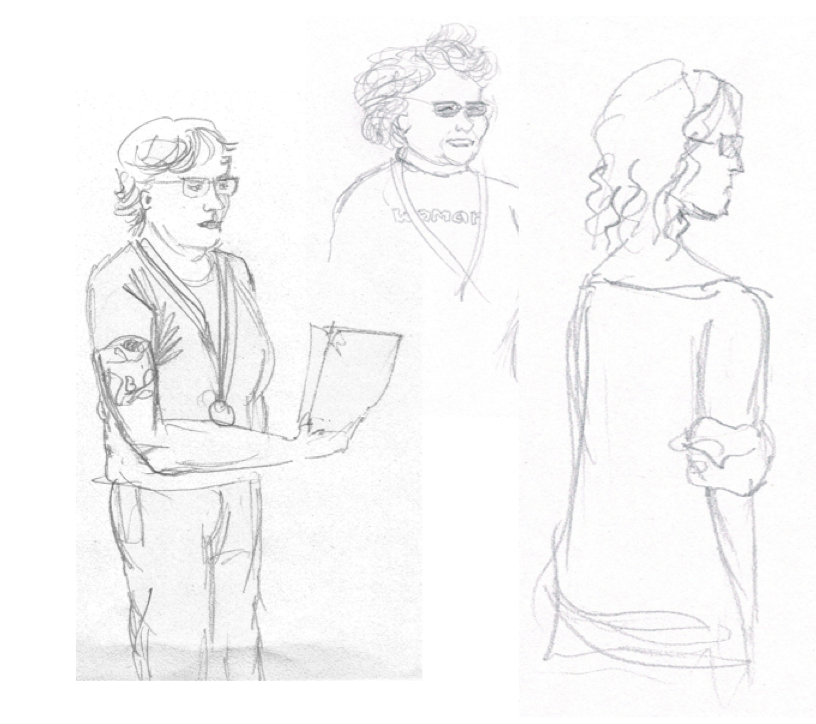
Shelley was next, speaking on behalf of Transgender Trend about the forthcoming GEO (Government Equalities Office) public consultation on the proposed legal ban on conversion therapy.
“If a ban on conversion therapy for gender identity comes in, it will be so restricting on good therapists who want to have open, neutral, conversations with children about their gender issues… it’s really important if any of you have any professional standing, that you get in touch with them now and tell them your concerns about a legal ban on gender identity conversion therapy.”
Shelley drew our attention to the story of James Eses, a trainee therapist who has been thrown off his course and lost his job as a volunteer for Childline for expressing the idea, on social media, that young people should not be rushed into ‘changing gender’ and for launching a petition to ‘safeguard evidence-based therapy for children struggling with gender dysphoria’. James has launched a Crowdfunder.
Reminding us of “the terrible things that have happened to children at the Tavistock,” Shelley concluded with a reminder about the consultation, “when the consultation comes out, I’d urge you all to participate and give a good submission to it.”
Posie reminded us that the event was being livestreamed and that we could watch it on YouTube later if we’d missed anything.
“Not everybody has a ranty fishwife type voice.”
She turned to Kate of LGB Alliance. “Do you Kate?”
Kate nodded.
“Yes, Kate does, so I’ll let her introduce herself!”
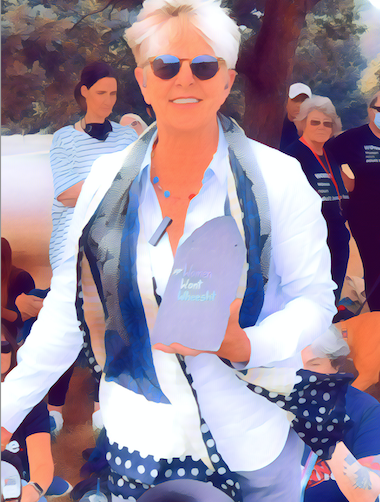
Kate of LGBA
Kate observed that a meeting in Cardiff is being planned (probably in September) “because the Welsh Government is the first government in the United Kingdom to decide to put gender identity ideology forward as the full plan for LGBTQ plus people in that country. And as in Scotland, women won’t wheesht!”
Despite writing to the first minister and others, LGB Alliance were not invited or allowed to contribute to the plan, “because they’re not very inclusive”. Kate said they had also been told that any written contributions may be ignored ‘if they’re transphobic’.
“Given that we know that saying ‘woman, adult human female’ is transphobic, we have a problem. So I encourage you to support our sisters and brothers in Wales.
Despite the warnings that ‘transphobic’ content would be ignored, Kate encouraged us to ‘support our sisters and brothers in Wales’ emphasising the importance of responding to the ‘hideous document’, and which she believes to be as important as the GRA consultation.
As I listened, I wandered around a little, exchanging a few quick words with familiar faces and taking pictures of some of the brilliant T shirts I came across.
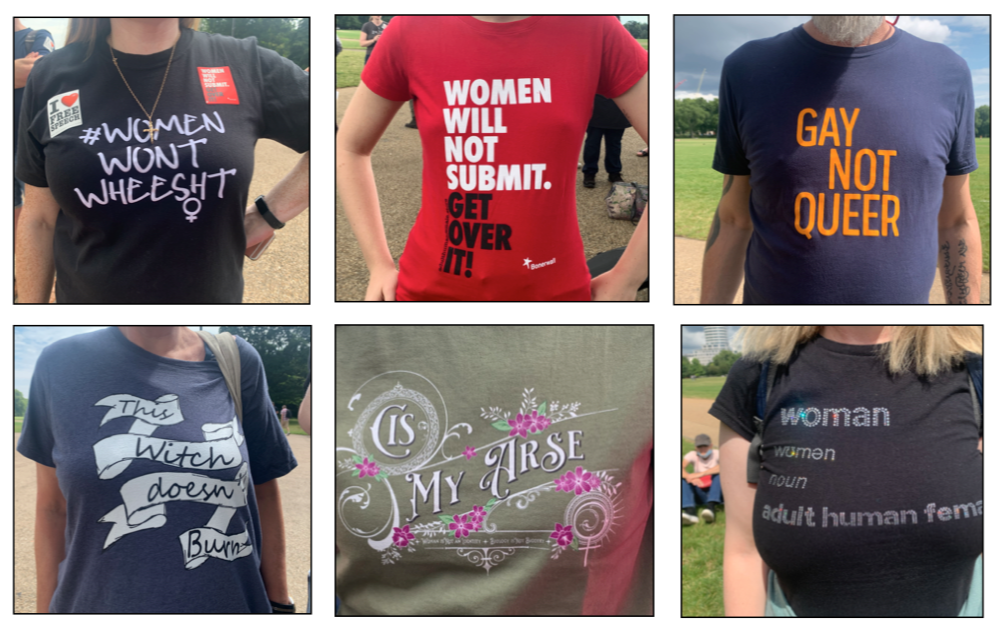

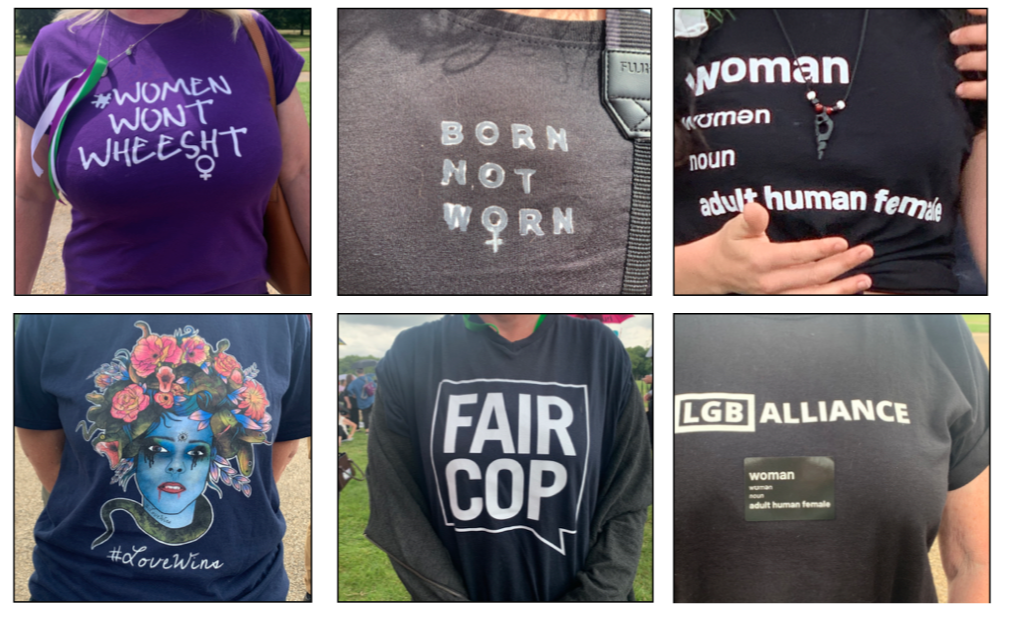
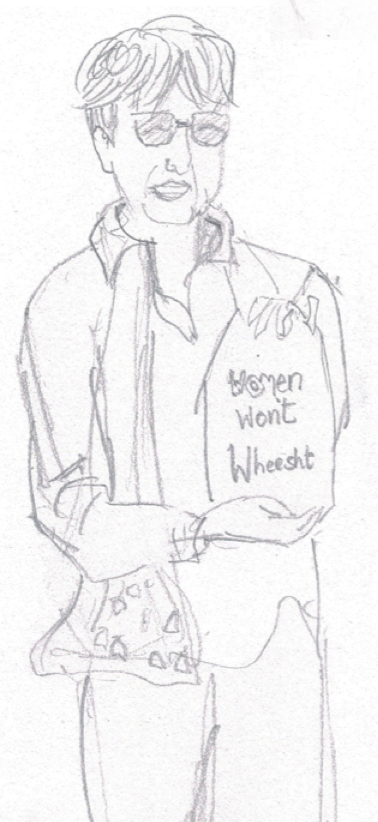 “I want to thank every single one of you who’ve supported us in any way whatsoever. It has been more or less a war of attrition, our opponents have wanted to destroy us from day one. They’re now taking us to court to try to have our charitable status removed: that hearing is coming up soon, and we will keep you posted. But let me say, it’s not going to happen!”
“I want to thank every single one of you who’ve supported us in any way whatsoever. It has been more or less a war of attrition, our opponents have wanted to destroy us from day one. They’re now taking us to court to try to have our charitable status removed: that hearing is coming up soon, and we will keep you posted. But let me say, it’s not going to happen!”
Kate told us of their ‘dramatic plan’, which will include helplines for LGB young people and a studio to make videos, films and music, “any kind of art to tell young people, it is not only good to be gay, it’s great to be gay, and it’s fabulous to be a lesbian!”
Kate reminded us that the LGB Alliance conference will be held in central London on the 21st of October.
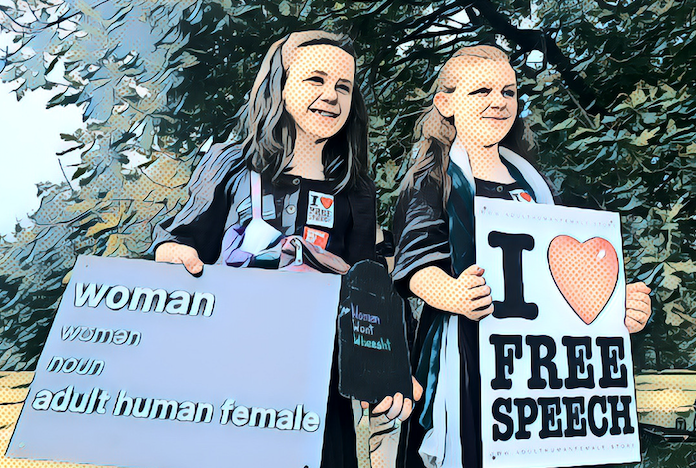
Kellie-Jay introduced two little girls who had come from Scotland to tell us, to much applause, “girls won’t wheest!”
A woman told us about her podcast (I missed the name) and how she was attacked in Portsmouth and has been called on by the police for saying women have the right to female-only spaces.
 Another, who used to be a senior domestic violence worker, specialising with women and children escaping severe abuse, told us, “I’ve seen children drop to the floor and scurry like beetles under the nearest table at the mere sound of a man’s voice. Children hitting and emulating sex with dolls because they’ve seen their mothers raped and abused. I’ve seen so many women having panic attacks when they hear even slightly raised male voices- men should not be allowed in women’s safe spaces!”
Another, who used to be a senior domestic violence worker, specialising with women and children escaping severe abuse, told us, “I’ve seen children drop to the floor and scurry like beetles under the nearest table at the mere sound of a man’s voice. Children hitting and emulating sex with dolls because they’ve seen their mothers raped and abused. I’ve seen so many women having panic attacks when they hear even slightly raised male voices- men should not be allowed in women’s safe spaces!”
She spoke of how the language of transactivism means women and girls are forced into using terms like ‘male bodied’ and ‘trans women’ and how what is now considered progressive “means breaking down safeguards for women and children (and) not allowing the word woman… for the very people who gave birth to every single human being on this planet!”
“We wear these T shirts… for women’s rights, we wear them for our daughters and our granddaughters and we wear them for all the women and children in shelters. We wear them because men should not be in women’s prisons, winning sports or any women’s spaces. We wear them because we are the women who refuse to lie, the women who refused to remain silent. The women who refuse to be gaslit, we are the women who are born, not worn!”
Women can all play our part in grass roots activism, she told us, and we owe it to ourselves to “wear a T-shirt, a badge, put a sneaky sticker on your local lamp post”. We can write to our MP and speak up IRL and on social media.
A woman spoke about transhumanism and how she believed vaccines had the potential to alter our DNA. She expressed concern that children as young as 13 are being referred to as young adults rather than children and that this raised issues surrounding culpability and consent.
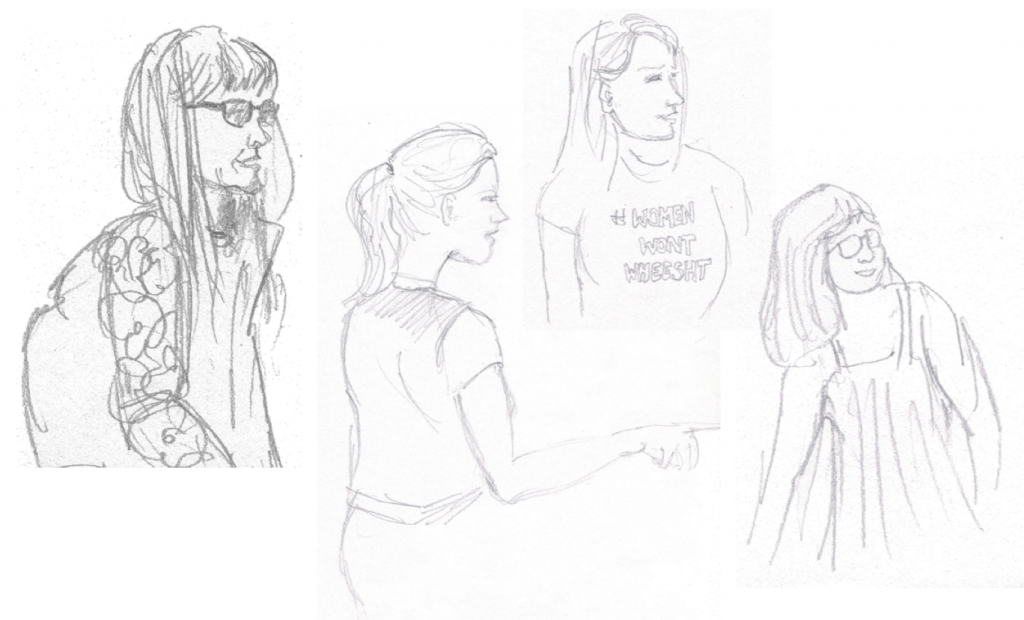
Some of the speakers – sketches by Michèle
Kellie-Jay asked us to keep the noise down and listen to those who had come to speak, reminding us that some people had come long distances to speak or to listen.
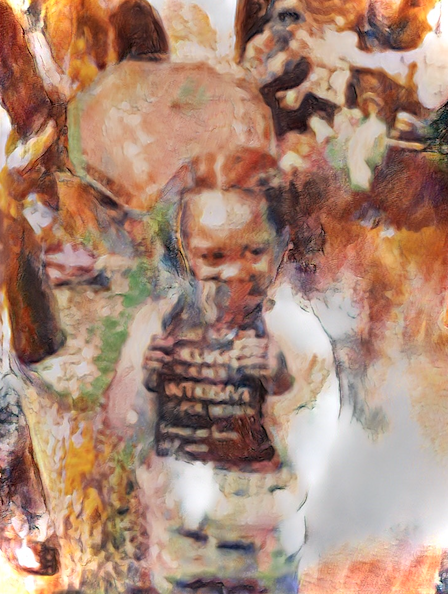
The littlest ‘Trixie Girl’.
A woman representing ‘the Trixie Girls’ spoke, with a little girl- ‘the youngest Trixie girl’- by her side. They were named after her great grandmother, she said, who in 1893 read Millicent Fawcett’s declaration for suffrage and joined the suffrage movement.
The Trixie Girls are starting a campaign called ‘Count Me In’, encouraging women to decorate permanent statues with ribbons and flowers in suffrage colours, then post the pictures on social media, and send them to their MP and the press.
A woman representing Fair Cop, a campaign group dedicated to stopping non-crime ‘hate incidents’, told us that there have been over 200,000 such incidents recorded by the police so far.
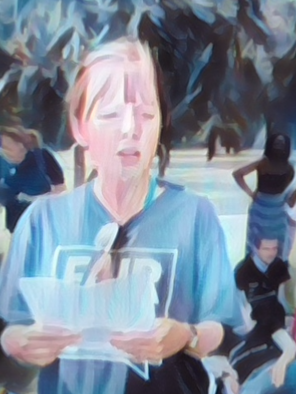 “No evidence is needed of hate. No evidence is needed of an incident. In fact no evidence is needed at all.
“No evidence is needed of hate. No evidence is needed of an incident. In fact no evidence is needed at all.
All that is needed is for someone, somewhere to decide that you have offended them by insisting that humans cannot change sex.”
The College of Policing has now extended its hate guidance into schools, we were told. A child, parent or teacher who shows support for single sex spaces or single sex sports, “or in any way shows resistance to the gender ideology, runs the risk of being branded a hater”.
“We cannot be frozen by fear,” she concluded, “as the police threatened to bring a rainbow coloured wrecking ball to our children’s futures”. Children need to grow up without being marked out by the police.
“Fair cop, and its small army of 18,000 supporters, will continue to do everything it can to bring an end to this Stonewall tide of tyranny.”
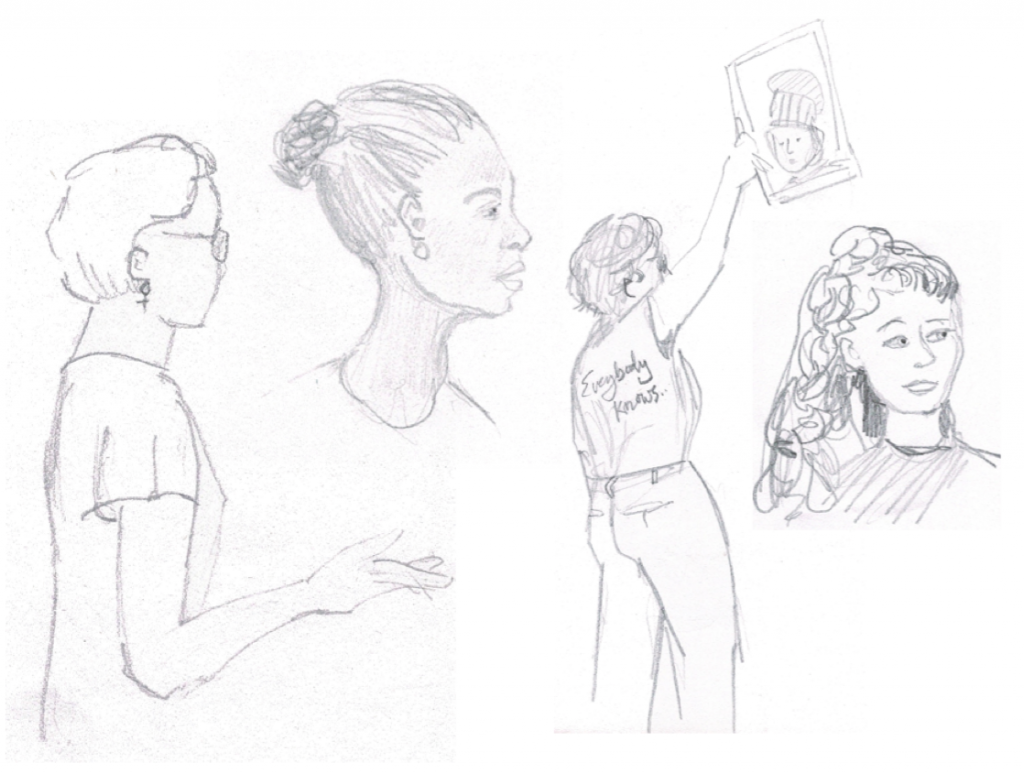
 “It’s lovely to see so many women and men supporting, and the children,” began the next speaker, a Green Party member. “I’m here as an individual; as a black woman. A woman concerned about what’s actually taking place across the world…”
“It’s lovely to see so many women and men supporting, and the children,” began the next speaker, a Green Party member. “I’m here as an individual; as a black woman. A woman concerned about what’s actually taking place across the world…”
She asked us to ‘hold politicians to account’ and ensure that they know the extent to which trans ideology is taking over various aspects of global society, adding that women need to organise, educate and fight back. Women are the grassroots activists, “they are the ones that are doing all the hard work”. She spoke of the importance of human rights and the possibility of creating “a mutual society where women will be protected, where you would pay a fee, unfortunately, but that fee will be towards protecting your rights… we have now discovered what’s happening, we ought to stand up and say no to the BS.”
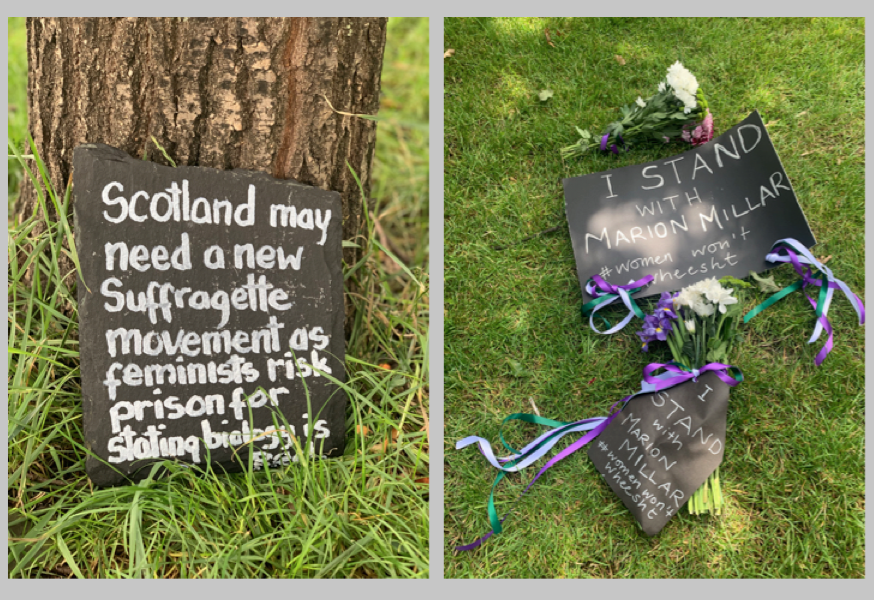
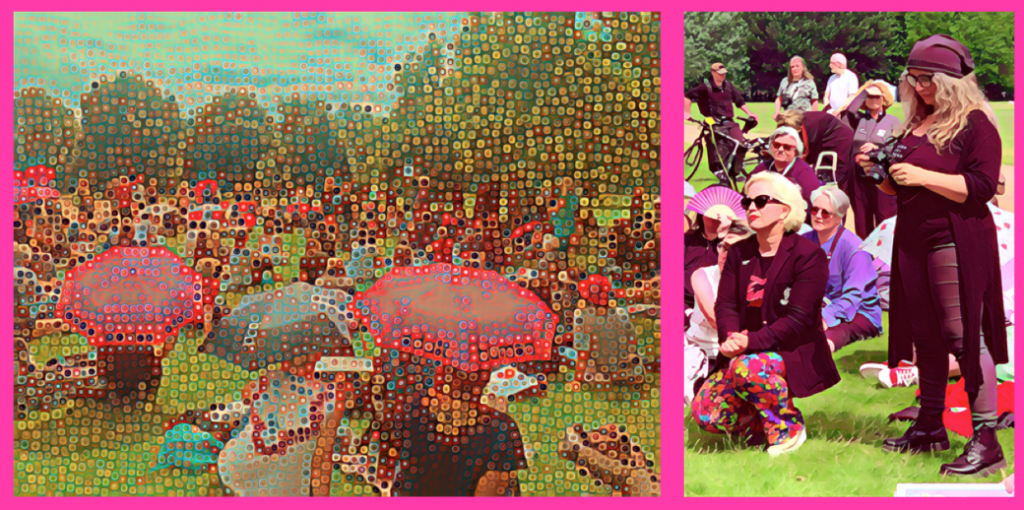
Claire had two pictures with her, one of Stormé DeLarverie and one of prison reformer Elizabeth Fry.
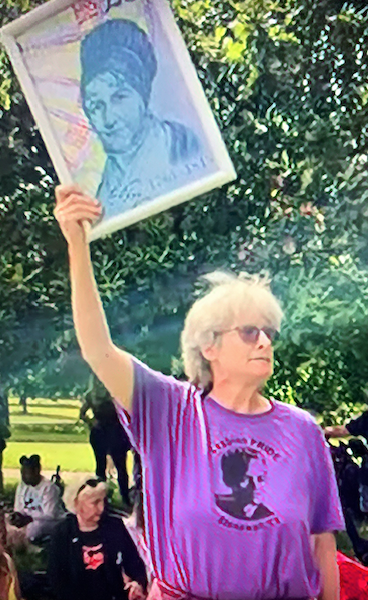 She told us about her petition to the UK Parliament to record, sex, ‘not only at the police level, not only at the court level, but at the prisons probate’. We are very close to the 10,000 to get the reply, she told us (the petition has now surpassed that number of signatories).
She told us about her petition to the UK Parliament to record, sex, ‘not only at the police level, not only at the court level, but at the prisons probate’. We are very close to the 10,000 to get the reply, she told us (the petition has now surpassed that number of signatories).
“I hope I can count on all of you to be sharing it and retweeting it and doing your best to get it out everywhere.”
She spoke passionately about the fight to get female guards in female prisons so women could be “protected from sexual exploitation, not only by the prisoners, but by the moral weirdos and guards as well”. The Quakers were aware of the importance of this. “99% of sexual offenders are male… regardless of gender identity… the reason we have sex segregated prisons is to prevent the rape of female prisoners.”
As an ex-prisoner, she said, who has served three short sentences, single-sex prisons is an important issue for her. Referring to men entering women’s spaces, she concluded:
“This is wrong, wrong, wrong, I cannot get NHS hospital care, I cannot use my local rape crisis network. When is this going to be serious enough?”
Posie asked if any other women wanted to speak and as nobody came forward, Menno stood up. He said that what’s been happening to women for quite a while now is now happening to gay men. “We’re losing the ability to simply say that we’re male homosexuals. This is now considered to be transphobic… this is an attack on the reality of our sex bodies, anything that we say that relates to our sexed bodies”.
 “This is just rehashing the homophobia from the old days, but now it’s kind of worse because now they’re saying you don’t have to be a man to be a gay man. You don’t have to be a woman to be a lesbian. So it’s not just that they’re looking down on same sex attraction is they’re completely erasing it, and they’re shaming us for it all over again. They’re shaming us as so called genital fetishists. Which is insane…
“This is just rehashing the homophobia from the old days, but now it’s kind of worse because now they’re saying you don’t have to be a man to be a gay man. You don’t have to be a woman to be a lesbian. So it’s not just that they’re looking down on same sex attraction is they’re completely erasing it, and they’re shaming us for it all over again. They’re shaming us as so called genital fetishists. Which is insane…
The other thing is that we’re losing guys, and this is something that as as as male homosexuals, need to look at, we’re seeing these young kids, I could have been today, that could have been me today if I was younger, if I was a 12 year old today, I’d be on that train… it’s perfectly okay to be a man, and to not be an alpha male, or a particular masculine bloke, or it’s okay to be a guy with a high voice… what we need to do is to widen that bandwidth of what what is okay for men to be, because that’s where all this shit is coming from… I’m not going to deny my sexual orientation for somebody else’s validation. We’re not going back in that closet.”
When Menno finished, Venice said she just wanted to say ‘thank you’ to Posie, and to the LGB Alliance, Transgender Trend and other groups.
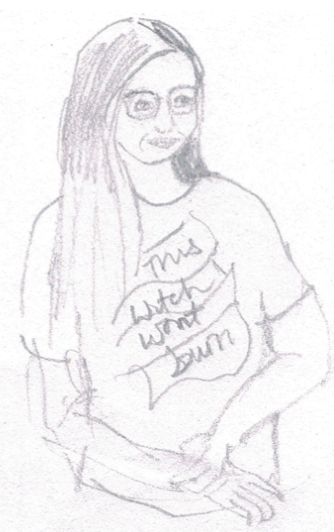 A woman thanked Flo Shirley (?) who organised the groups coming down from Scotland. She also thanked everyone for coming. “We need to get together, to stay together. So connecting is really important.”
A woman thanked Flo Shirley (?) who organised the groups coming down from Scotland. She also thanked everyone for coming. “We need to get together, to stay together. So connecting is really important.”
A young woman stood up and said that Essex Resisters had just been founded, adding, “last weekend, I got my first death threats for saying that adult human female is a woman and a man could not be a woman. They wanted to see if this witch would burn. I’d just like to say that this witch doesn’t burn!”
Next was Phoebe from the Cambridge radical feminist network.
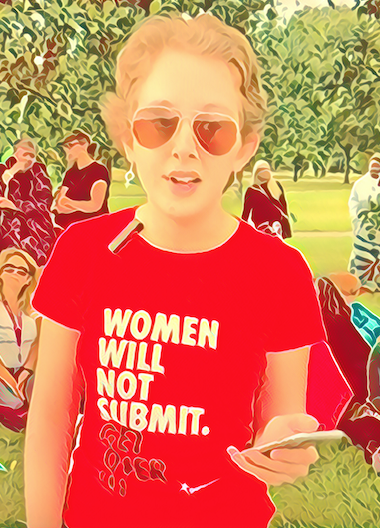 “I don’t want to talk about trans stuff today, I want to talk about another thing which I think is an existential threat to women’s rights and that’s prostitution, sex work and pornography… I was dismayed to see that the Labour Party has signed an open letter against the Nordic model… they deeply, dishonestly, mischaracterise the Nordic model as an approach which… exacerbates violence and harm against those who are prostituted, when this just isn’t the case. They also said it’s widely opposed by sex workers: I think well, they actually mean by that is it’s widely opposed by university students who might have an only fans account… this is not the reality for the majority of prostituted women who are some of the most marginalised and victimised in our society.”
“I don’t want to talk about trans stuff today, I want to talk about another thing which I think is an existential threat to women’s rights and that’s prostitution, sex work and pornography… I was dismayed to see that the Labour Party has signed an open letter against the Nordic model… they deeply, dishonestly, mischaracterise the Nordic model as an approach which… exacerbates violence and harm against those who are prostituted, when this just isn’t the case. They also said it’s widely opposed by sex workers: I think well, they actually mean by that is it’s widely opposed by university students who might have an only fans account… this is not the reality for the majority of prostituted women who are some of the most marginalised and victimised in our society.”
A young woman told us that her mother had been involved in the women’s movement before her and that she would like to see a feminist social group established in the area. (There is one already, but I didn’t see her later to tell her.)
“I’ve met so many wonderful, talented skilled women, and I want to learn from them; want to grow with them, so if that’s something that you’re involved in, want to be involved in or interested in, please come and talk to me.”
Finally, Posie told us that it had been Venice’s idea to meet at the Reformer’s Tree,“It was such a brilliant vibrant place… oh, it’s gonna rain! Well, the sun shone for women’s rights today which is good.”
Adding that each week she saw more people coming and feeling that they could speak, she said she hoped it meant they could “take that bravery and that courage into other places in their lives… be a little bit braver with your language, try and not hold back when you need to say something, because what you have to say is really really important and it’s only the the silence, and the accumulative effect of everybody’s silence, that has got us into this space.”
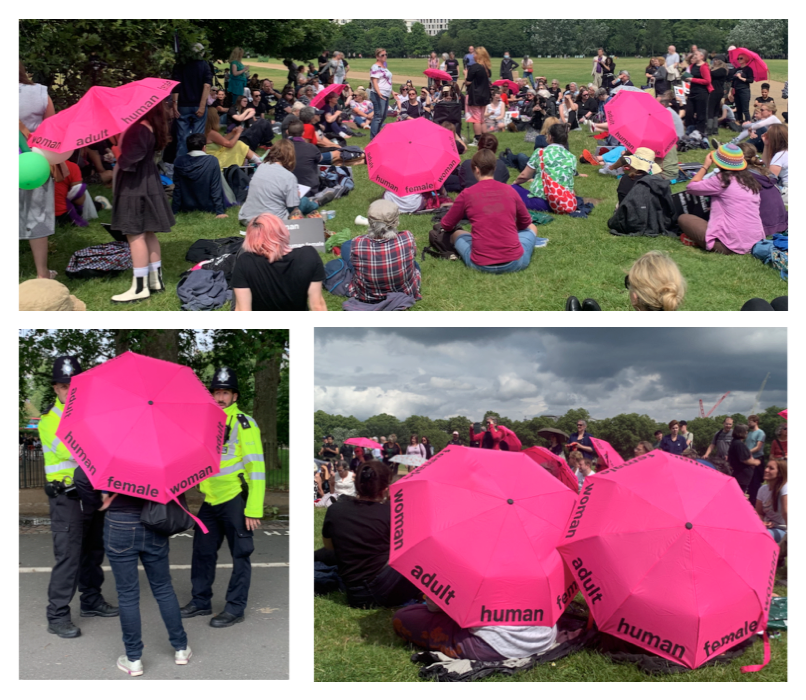
And then it did rain, which was fine, because we were done. It was refreshing to walk through the open space of the park, watching the pink umbrellas spreading out like little pacmen around the network of paths.
At least half of us headed for the pub, where a huge, wooden-beamed room had been reserved for us, and there we supped a variety of bevvys and ate a quantity of chips and much merriment was made.
And I got to cuddle a baby for the first time in ages, which was the perfect end to a pretty good day.
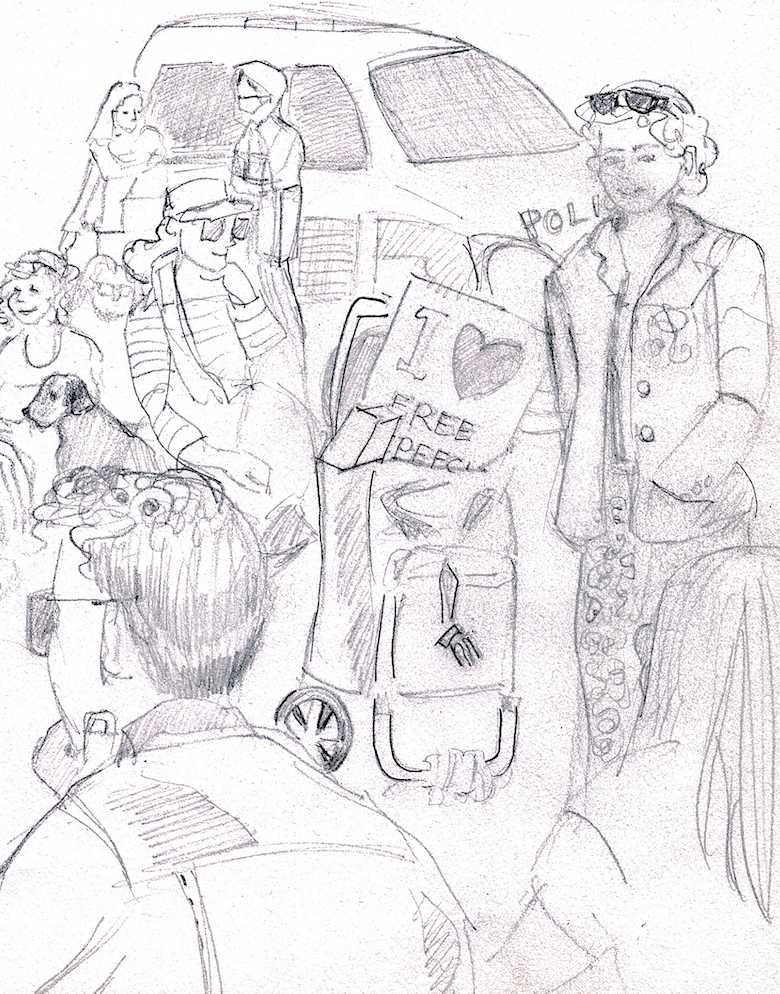

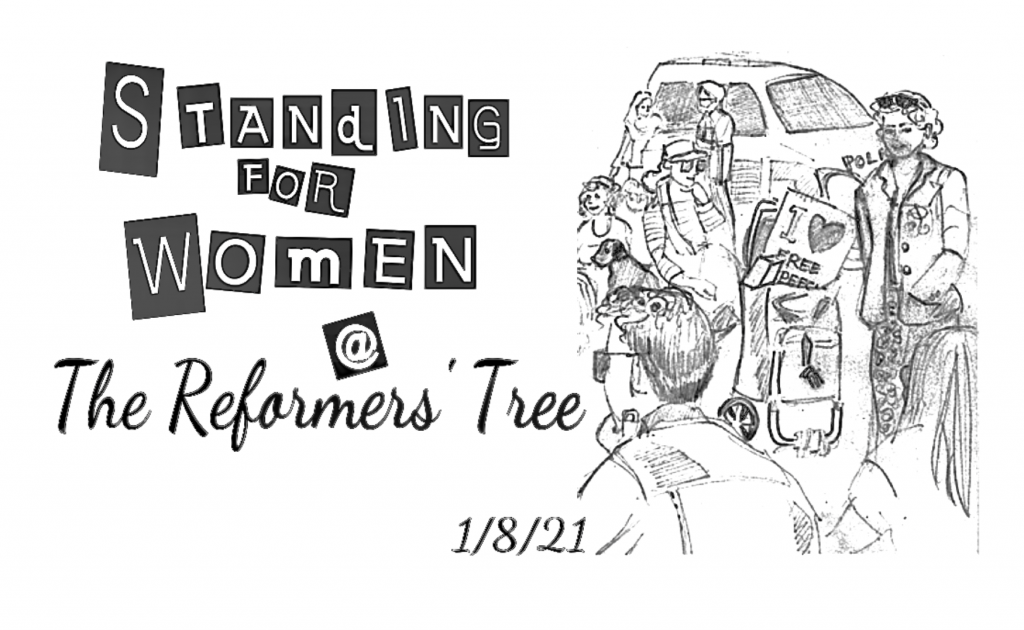
Pingback: Standing for Women at the Reformers Tree - June 2022 -Lily Maynard